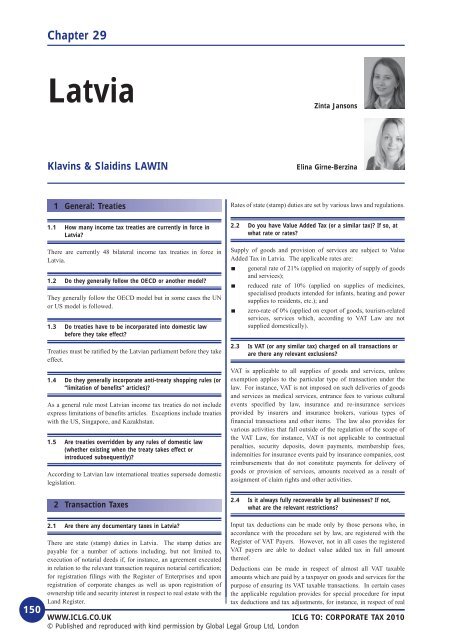Corporate Tax 2010 - BMR Advisors
Corporate Tax 2010 - BMR Advisors
Corporate Tax 2010 - BMR Advisors
You also want an ePaper? Increase the reach of your titles
YUMPU automatically turns print PDFs into web optimized ePapers that Google loves.
Chapter 29<br />
Latvia<br />
Zinta Jansons<br />
Klavins & Slaidins LAWIN<br />
Elina Girne-Berzina<br />
1 General: Treaties<br />
Rates of state (stamp) duties are set by various laws and regulations.<br />
1.1 How many income tax treaties are currently in force in<br />
Latvia<br />
There are currently 48 bilateral income tax treaties in force in<br />
Latvia.<br />
1.2 Do they generally follow the OECD or another model<br />
They generally follow the OECD model but in some cases the UN<br />
or US model is followed.<br />
1.3 Do treaties have to be incorporated into domestic law<br />
before they take effect<br />
Treaties must be ratified by the Latvian parliament before they take<br />
effect.<br />
1.4 Do they generally incorporate anti-treaty shopping rules (or<br />
“limitation of benefits” articles)<br />
As a general rule most Latvian income tax treaties do not include<br />
express limitations of benefits articles. Exceptions include treaties<br />
with the US, Singapore, and Kazakhstan.<br />
1.5 Are treaties overridden by any rules of domestic law<br />
(whether existing when the treaty takes effect or<br />
introduced subsequently)<br />
According to Latvian law international treaties supersede domestic<br />
legislation.<br />
2 Transaction <strong>Tax</strong>es<br />
2.2 Do you have Value Added <strong>Tax</strong> (or a similar tax) If so, at<br />
what rate or rates<br />
Supply of goods and provision of services are subject to Value<br />
Added <strong>Tax</strong> in Latvia. The applicable rates are:<br />
general rate of 21% (applied on majority of supply of goods<br />
and services);<br />
reduced rate of 10% (applied on supplies of medicines,<br />
specialised products intended for infants, heating and power<br />
supplies to residents, etc.); and<br />
zero-rate of 0% (applied on export of goods, tourism-related<br />
services, services which, according to VAT Law are not<br />
supplied domestically).<br />
2.3 Is VAT (or any similar tax) charged on all transactions or<br />
are there any relevant exclusions<br />
VAT is applicable to all supplies of goods and services, unless<br />
exemption applies to the particular type of transaction under the<br />
law. For instance, VAT is not imposed on such deliveries of goods<br />
and services as medical services, entrance fees to various cultural<br />
events specified by law, insurance and re-insurance services<br />
provided by insurers and insurance brokers, various types of<br />
financial transactions and other items. The law also provides for<br />
various activities that fall outside of the regulation of the scope of<br />
the VAT Law, for instance, VAT is not applicable to contractual<br />
penalties, security deposits, down payments, membership fees,<br />
indemnities for insurance events paid by insurance companies, cost<br />
reimbursements that do not constitute payments for delivery of<br />
goods or provision of services, amounts received as a result of<br />
assignment of claim rights and other activities.<br />
2.4 Is it always fully recoverable by all businesses If not,<br />
what are the relevant restrictions<br />
150<br />
2.1 Are there any documentary taxes in Latvia<br />
There are state (stamp) duties in Latvia. The stamp duties are<br />
payable for a number of actions including, but not limited to,<br />
execution of notarial deeds if, for instance, an agreement executed<br />
in relation to the relevant transaction requires notarial certification;<br />
for registration filings with the Register of Enterprises and upon<br />
registration of corporate changes as well as upon registration of<br />
ownership title and security interest in respect to real estate with the<br />
Land Register.<br />
Input tax deductions can be made only by those persons who, in<br />
accordance with the procedure set by law, are registered with the<br />
Register of VAT Payers. However, not in all cases the registered<br />
VAT payers are able to deduct value added tax in full amount<br />
thereof.<br />
Deductions can be made in respect of almost all VAT taxable<br />
amounts which are paid by a taxpayer on goods and services for the<br />
purpose of ensuring its VAT taxable transactions. In certain cases<br />
the applicable regulation provides for special procedure for input<br />
tax deductions and tax adjustments, for instance, in respect of real<br />
WWW.ICLG.CO.UK<br />
ICLG TO: CORPORATE TAX <strong>2010</strong><br />
© Published and reproduced with kind permission by Global Legal Group Ltd, London
















